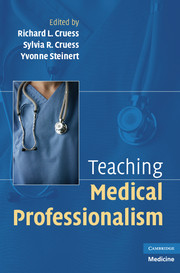Book contents
- Frontmatter
- Contents
- List of Contributors
- Foreword by William M. Sullivan
- Introduction
- PART ONE WHAT IS TO BE TAUGHT
- PART TWO THEORY
- PART THREE PRINCIPLES
- 4 Principles for Designing a Program for the Teaching and Learning of Professionalism at the Undergraduate Level
- 5 Resident Formation – A Journey to Authenticity: Designing a Residency Program That Educes Professionalism
- 6 Supporting Teaching and Learning of Professionalism – Changing the Educational Environment and Students' “Navigational Skills”
- 7 Assessment and Remediation in Programs of Teaching Professionalism
- 8 Developing Professionalism across the Generations
- 9 Faculty Development for Teaching and Learning Professionalism
- 10 The Relationship between Teaching Professionalism and Licensing and Accrediting Bodies
- 11 Educating the Public about Professionalism: From Rhetoric to Reality
- PART FOUR PRACTICE: CASE STUDIES IN TEACHING PROFESSIONALISM ACROSS THE CONTINUUM
- APPENDIX A Definitions of Professionalism
- APPENDIX B Core Attributes of Professionalism
- APPENDIX C The Teaching of Professionalism: Vignettes for Discussion
- APPENDIX D A Matrix for “Matching” Teaching Methods to Attributes
- APPENDIX E Sample Grid for Use with Discussion of Vignettes
- APPENDIX F Sample Questions to Guide Discussion about the Social Contract: Small-Group Leaders' Guide with Suggested Responses
- APPENDIX G Professionalism Program for Residents: Suggested Outline for Small Group Facilitators
- APPENDIX H Sample Evaluation Form for Residents' Half-Day Program on Professionalism
- Index
- References
5 - Resident Formation – A Journey to Authenticity: Designing a Residency Program That Educes Professionalism
Published online by Cambridge University Press: 01 September 2009
- Frontmatter
- Contents
- List of Contributors
- Foreword by William M. Sullivan
- Introduction
- PART ONE WHAT IS TO BE TAUGHT
- PART TWO THEORY
- PART THREE PRINCIPLES
- 4 Principles for Designing a Program for the Teaching and Learning of Professionalism at the Undergraduate Level
- 5 Resident Formation – A Journey to Authenticity: Designing a Residency Program That Educes Professionalism
- 6 Supporting Teaching and Learning of Professionalism – Changing the Educational Environment and Students' “Navigational Skills”
- 7 Assessment and Remediation in Programs of Teaching Professionalism
- 8 Developing Professionalism across the Generations
- 9 Faculty Development for Teaching and Learning Professionalism
- 10 The Relationship between Teaching Professionalism and Licensing and Accrediting Bodies
- 11 Educating the Public about Professionalism: From Rhetoric to Reality
- PART FOUR PRACTICE: CASE STUDIES IN TEACHING PROFESSIONALISM ACROSS THE CONTINUUM
- APPENDIX A Definitions of Professionalism
- APPENDIX B Core Attributes of Professionalism
- APPENDIX C The Teaching of Professionalism: Vignettes for Discussion
- APPENDIX D A Matrix for “Matching” Teaching Methods to Attributes
- APPENDIX E Sample Grid for Use with Discussion of Vignettes
- APPENDIX F Sample Questions to Guide Discussion about the Social Contract: Small-Group Leaders' Guide with Suggested Responses
- APPENDIX G Professionalism Program for Residents: Suggested Outline for Small Group Facilitators
- APPENDIX H Sample Evaluation Form for Residents' Half-Day Program on Professionalism
- Index
- References
Summary
Hope is not the same as optimism. An optimist ignores the facts in order to come to a comforting conclusion. But a hopeful person faces the facts without blinking – and then looks behind them for potentials that have yet to emerge – knowing that the human experiment would never have advanced were it not for the possibilities, however slim, that lie hidden behind the facts.
In May, 2002, Parker Palmer facilitated a retreat for residency program directors who had received the Accreditation Council for Graduate Medical Education's (ACGME's) Parker Palmer Courage to Teach Award. During the retreat, a case was presented, a case in which a liver transplant donor had died while in intensive care. He died despite the fact that the surgery had gone smoothly and despite the fact that his wife, who was with him throughout the entire postsurgical period, insisted repeatedly and to no avail that her husband was going downhill fast. Three months later, the state health commissioner issued an incident report saying, “The hospital allowed this patient to undergo a major high-risk procedure and then left his postoperative care in the hands of an overburdened, mostly junior staff, without appropriate supervision.” On the day the donor died, a first-year surgical resident with twelve days of experience in the transplant unit had been left alone to care for thirty-four patients. She could not – and did not – monitor every patient with the care and precision required.
- Type
- Chapter
- Information
- Teaching Medical Professionalism , pp. 93 - 107Publisher: Cambridge University PressPrint publication year: 2008
References
- 1
- Cited by



